Having spent the last several years working with European small businesses and introducing them to AI and automation tools as a digital strategist, I know how confusing and vague the technology environment can be. Whether it is figuring out how to meet GDPR or selecting the appropriate marketing, customer care, or business process solutions, the stress is palpable.
I have worked with startups, freelancers, and family-owned companies throughout Europe, and they all share one thing: they require tools that deliver results without complicating their processes.
So, in this guide, I have done the hard work for you by researching and selecting the top AI tools for European small businesses in 2025. My solutions simplify essential business activities, such as productivity growth and customer support development, to ensure your venture stays ahead in the future market.
These intelligent solutions help your business grow and stay ahead of competitors through marketing, betterment, customer support, and productivity enhancement.
Why AI Matters for European SMBs Going into 2025: Benefits and Opportunities
Increased Productivity and Efficiency
AI tools are designed to streamline your business operations. They can help automate time-consuming tasks, such as data entry, scheduling, and report generation.
The use of AI reduces human-operated tasks, enabling your team members to focus on creative work and value-driven tasks. To explore how cutting-edge innovations like DeepMindās multimodal AI are shaping the future of intelligent tools, donāt miss our GITEX Global Preview, DeepMind Multimodal AI article.
Improved Customer Engagement and Service
The use of AI leads to better interaction between customers and businesses as well as enhanced service delivery. Through AI-driven chatbots, companies can offer real-time customer support that automatically answers inquiries and guides users to the necessary information, resolving routine issues.
Enhanced Marketing and Sales Effectiveness
AI isnāt just for operational tasks it can also boost your marketing efforts. AI tools can help you target the right audience with greater precision, optimize your ad spending, and even generate marketing content.
Better Data Analysis and Decision Making
AI transforms multiple forms of raw data, such as customer feedback, sales numbers, and website traffic, into actionable decisions that drive outcomes. Data analysis has never been easier, but with the help of AI, you can spot patterns and predict outcomes that also validate your decisions without requiring specialized data expertise.
Navigating the Landscape: Challenges and Considerations for European SMBs
Data Privacy and GDPR Compliance
One of the biggest concerns for small businesses in Europe is ensuring AI tools comply with GDPR (General Data Protection Regulation). Under GDPR rules, companies must adhere to strict regulations regarding the handling and storage of their users’ personal information. When selecting AI tools, ensure they adhere to these guidelines.
Always select AI tools that have clear privacy and data protection policies. Ensure the tool is GDPR-compliant to safeguard your business.
Expert Tip
Integration with Existing Systems
The integration of AI systems into existing business applications poses another significant challenge. Integrating new AI tools should avoid disrupting your current processes and ensure proper system connections to all your existing software and frameworks..
Start integrating AI tools gradually into your existing systems. This method helps you check the functionality to feel confident using the tool altogether.
Expert Tip
Cost vs. Benefit Analysis
Subscribing to AI tools, along with their implementation expenses, may involve subscription costs, setup expenses, and the need for employee training sessions. Your business gains multiple advantages from these tools, but you must evaluate whether these advantages sufficiently justify their costs.
Consider the full cost of the tool, including the monthly fees, setup costs, and training. Ensure that the benefits you will receive from the tool are worth the investment.
Expert Tip
Lack of Technical Expertise
The absence of technology professionals prevents small businesses from establishing and running AI tools. Some AI tools are easy to use, while others require a basic understanding of technology before use. Businesses without dedicated IT departments often face challenges when utilizing AI tools.
Invest in training for your team to ensure they know how to use the AI tools effectively. Tools in the market provide built-in customer support that guides users through challenges they may encounter.
Expert Tip
Choosing the Right Tool
With so many AI tools on the market, it is hard to know which ones are right for your business. Some tools are made for large companies, but SMBs need solutions that are affordable, easy to use, and help them grow. When selecting tools, ensure they are designed for small businesses like yours.
Be cautious when evaluating vendor claims. Reviewing independent business feedback, combined with customer solution reviews from other companies, ensures the tool meets its performance standards.
Expert Tip
Our Methodology: How We Selected the Top 10 AI Tools for 2025
Relevance to European SMB Needs
Our research focuses on identifying platform solutions that address the typical challenges faced by small companies across Europe. We examined AI tools that can be seamlessly integrated into daily business operations, specifically tailored for European small businesses.
European Relevance and Compliance (GDPR Focus)
Small businesses in Europe must prioritize data privacy, as the GDPR maintains strict standards. We selected AI tools that offer a straightforward user experience during implementation, while also being easy to understand and operate.
Donāt be afraid to explore AI tools developed by European startups. These tools are often better suited to local needs and regulations.
Expert Tip
Ease of Use and Implementation
The AI tools we recommend are chosen for their simplicity and ease of use. We selected AI tools that allow small businesses to install and use them immediately, as companies of their size often struggle with new technology.
Affordability and Value for Money
As a small business, cost is always a consideration. We selected AI tools that provide maximum value through their pricing model, combined with clear benefits to future performance. Every AI tool we recommend offers significant benefits to small organizations.
Key Features and Innovation
Each AI tool in our list comes with features that bring tangible benefits to small businesses. When you need solutions that make marketing simpler and improve data analysis, a lot of our chosen tools do precisely that.
Market Reputation and Reliability
We selected tools known for delivering reliable service across the AI market. Other business owners use these tools and recommend them because they have consistently helped small companies reach their targets. We verified whether the companies behind these tools will continue to exist and support your business in the future.
Top 10 AI Tools for European Small Businesses in 2025: Detailed Profiles
Ā Jasper (AI Writing Assistant)
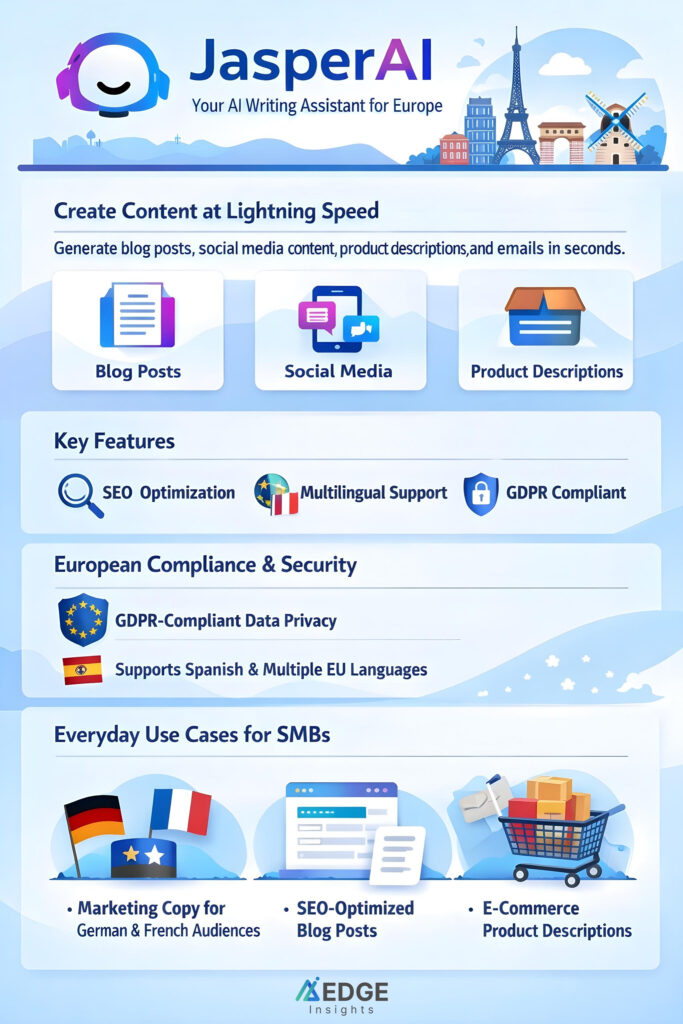
The AI writing tool Jasper helps businesses generate professional content at speed. Whether you need the blog posts, social media content, product descriptions, or email templates, JasperAI can generate them all with just a few prompts.
Key Features:
- Content generation for blogs, social media, advertisements, and more.
- SEO optimization for better search engine ranking.
- Multilingual support for diverse European markets.
European Considerations & Compliance:
- GDPR-compliant data handling and security.
- Supports multiple European languages (French, German, Spanish, etc.).
Everyday Use Cases for European SMBs:
- Generate marketing copy for German or French audiences.
- Write SEO-optimized blog posts and articles for European websites.
- Craft product descriptions for international e-commerce stores.
Canva AI (AI Design & Image Generation)
The Canva AI design system enables businesses of all sizes to create eye-catching visual content that works perfectly for various platforms, including social media, websites, and marketing materials.
Key Features:
- Design templates for social media, presentations, advertisements, and more.
- AI-powered design suggestions and image editing tools.
- Collaboration features for team-based design projects.
European Considerations & Compliance:
- GDPR-compliant data storage and processing.
- Multilingual support for creating content in various European languages.
Everyday Use Cases for European SMBs:
- Create social media posts for French and Italian audiences.
- Design marketing materials for a European-wide campaign.
- Create eye-catching ads for Google Ads or print media.
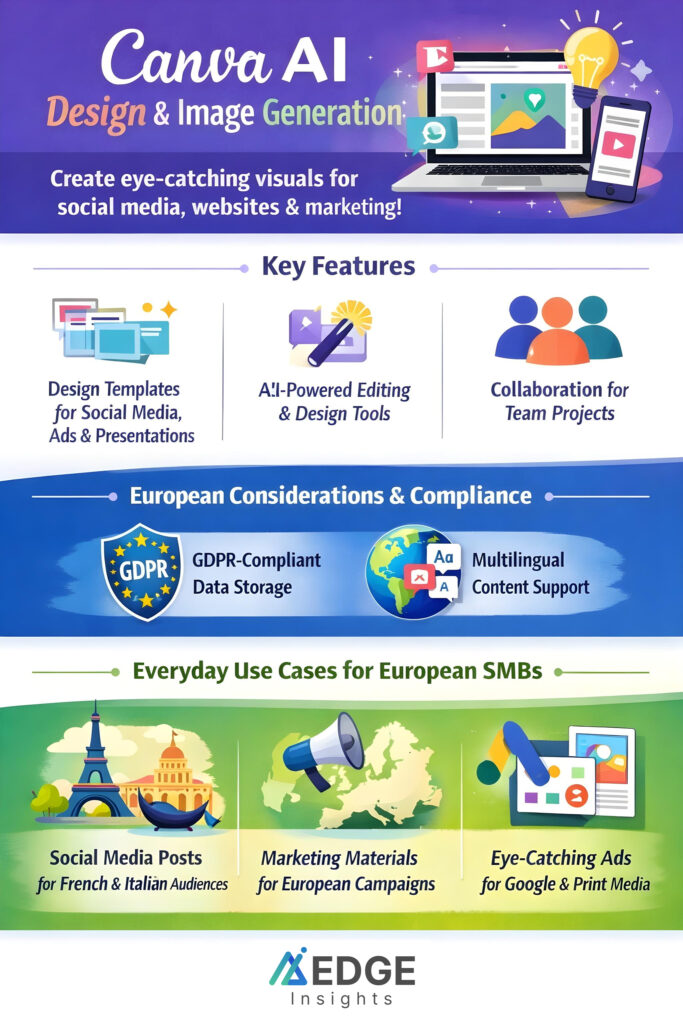
Notion AI (AI Productivity & Workflow Tool)
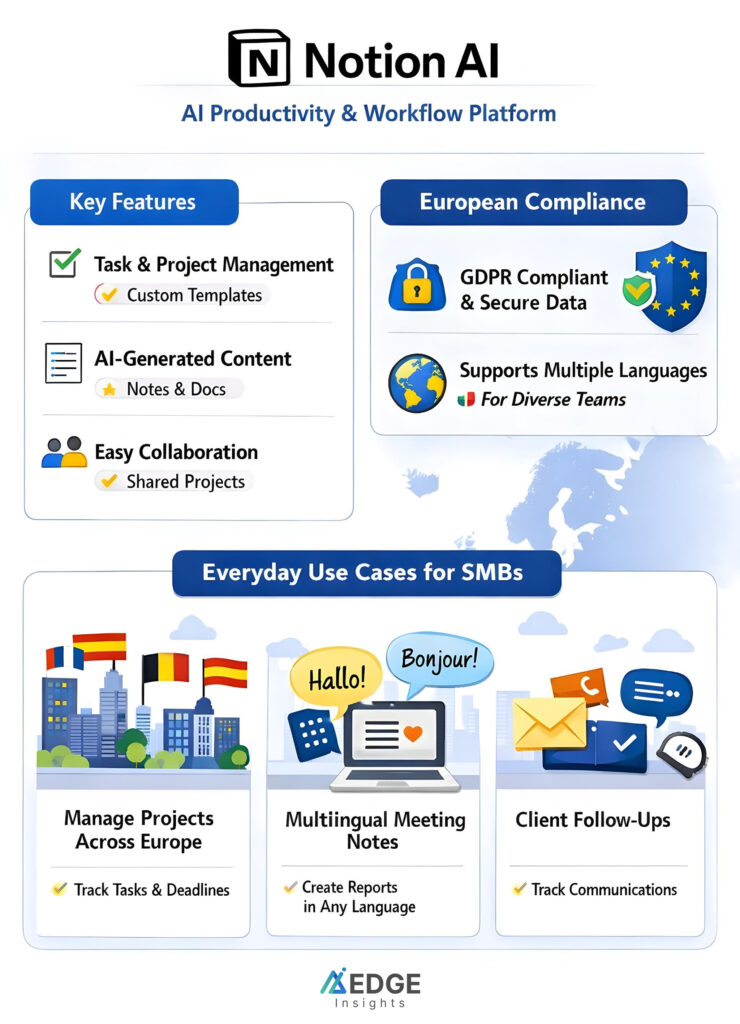
Notion AI is a productivity tool that helps SMBs organize their tasks, projects, and notes in one platform. Users can leverage AI features to generate content and manage their tasks and workflows efficiently.
Key Features:
- Task and project management with customizable templates.
- AI-generated notes, outlines, and documents.
- Easy collaboration on shared projects.
European Considerations & Compliance:
- GDPR-compliant with secure data handling.
- Supports multiple languages, ideal for diverse teams in Europe.
Everyday Use Cases for European SMBs:
- Manage team projects and deadlines across multiple European locations.
- Organize meeting notes and create reports in different languages.
- Keep track of client communications and follow-ups.Ā Ā
Acquire.io (AI Customer Support Chatbot)
Acquire. io functions as a customer support platform by enabling AI-driven chatbots to provide continuous assistance to customers through its system. The AI chatbot can handle common inquiries, guide customers through troubleshooting steps, and escalate more complex issues to human agents.
Key Features:
- 24/7 AI-powered customer support chatbots.
- Multilingual support for global customer bases.
- Live chat escalation for complex issues.
European Considerations & Compliance:
- GDPR-compliant with secure data processing.
- Supports various European languages (German, French, Spanish, etc.).
Everyday Use Cases for European SMBs:
- Provide 24/7 support in English, French, and Spanish.
- Automate responses to common customer inquiries on your website.
- Offer chatbot support in multiple languages for international customers.
HubSpot AI (AI Marketing & Sales Tools)
The HubSpot AI platform leverages AI technology to support business operations, including lead generation, customer relationship management, and marketing effectiveness enhancement. With features like email automation, customer insights, and sales forecasting, HubSpot AI simplifies many aspects of marketing and sales for SMBs.
Key Features:
- Lead generation and nurturing through AI-powered tools.
- Automated email marketing campaigns.
- Sales forecasting and customer insights.
European Considerations & Compliance:
- Fully GDPR-compliant data management.
- Multilingual support for European audiences.
Common Use Cases for European SMBs:
- Use AI to generate leads from visitors in Spain, France, and Germany.
- Automate email campaigns tailored to different European markets.
- Use sales insights to forecast demand for upcoming quarters.
Google Analytics AI (AI Data Analysis Tools)
Through AI functionality, Google Analytics provides businesses with extensive performance data analysis about their website. Using detailed analyses of user traffic patterns, behavioural data, and conversion metrics, the system enables companies to make data-driven decisions.
Key Features:
- AI-driven insights and recommendations for improving website performance.
- Audience segmentation for targeted marketing.
- Conversion tracking for optimizing sales funnels.
European Considerations & Compliance:
- GDPR-compliant with secure data processing.
- Supports multiple European languages.
Common Use Cases for European SMBs:
- Analyze traffic from various European countries to inform targeted marketing efforts.
- Track conversion rates for e-commerce stores in various European regions.
- Use AI insights to improve content strategy for German and French audiences.
QuickBooks AI (AI Financial Forecasting Tools)
QuickBooks AI is an accounting and financial forecasting tool that uses AI to help small businesses manage their finances, predict cash flow, and prepare for tax season. It automatically categorizes expenses, generates reports, and offers AI-driven financial insights.
Key Features:
- Automated expense tracking and categorization.
- Cash flow forecasting and financial insights.
- Tax preparation and report generation.
European Considerations & Compliance:
- Fully GDPR-compliant for financial data handling.
- Multi-currency support, ideal for businesses operating across Europe.
Everyday Use Cases for European SMBs:
- Track expenses and generate the financial reports for a multi-country business.
- Forecast cash flow for upcoming months in different European currencies.
- Prepare tax reports for your business operating in various European countries.
Zapier AI (AI Productivity & Workflow Tools)
The workflow automation tool Zapier enables small businesses to automate the synchronization and management of their software applications. Itās beneficial for companies looking to save time and reduce manual work.
Key Features:
- Automates workflows by connecting multiple apps.
- Customizable āZapsā to automate repetitive tasks.
- Integrates with over 2,000 apps, including Google Sheets, Slack, and more.
European Considerations & Compliance:
- GDPR-compliant with secure data handling.
- Ensures secure and private data transfer across various European apps.
Common Use Cases for European SMBs:
- Automate data syncing between CRM and accounting tools.
- Create workflows that automatically notify your team of new leads from Europe.
- Set up automated email alerts based on customer activity.
DALL-E (AI Design & Image Generation)
The AI-powered tool DALL-E functions as an image generator from OpenAI. It enables SMBs to create high-quality images and visuals for marketing, social media, websites, and other purposes. A text prompt entry enables businesses to obtain customized, original images that meet their precise requirements.
Key Features:
- Text-to-image generation based on prompts.
- Customization options for image design.
- Ideal for creating visually unique marketing materials.
European Considerations & Compliance:
- GDPR-compliant in data handling.
- Adaptable for diverse European markets with culturally relevant designs.
Common Use Cases for European SMBs:
- Generate custom images for social media posts or blog articles.
- Create marketing materials without needing a designer.
- Design unique visuals for European market campaigns.
Rytr (AI Writing Assistant)
Rytr operates as an artificial intelligence-powered tool to help companies develop content quickly while maintaining high quality. Rytr assists businesses by producing high-quality content for blog posts, email campaigns, and social media updates from basic instructions.
Key Features:
- Content creation for blogs, ads, and product descriptions.
- SEO-optimized content generation.
- Multiple writing tones and styles.
European Considerations & Compliance:
- GDPR-compliant with secure data storage.
- Supports content generation in several European languages.
Common Use Cases for European SMBs:
- Write SEO-friendly blog posts for audiences in France, Spain, or Germany.
- Generate product descriptions for e-commerce websites targeting European customers.
- Create marketing copy in various languages for international campaigns.
Top AI Tools for SMBs in Europe
| Tool Name | Primary Function | Key SMB Features | European Relevance/Compliance | Pricing | Ease of Use |
|---|---|---|---|---|---|
| Jasper | AI Writing Assistant | Content generation, SEO, multilingual support | GDPR-compliant, multi-language | From $29/month | Easy |
| Canva AI | AI Design & Image Generation | Templates, AI suggestions, editing | GDPR-compliant, multilingual UI | Free, Pro $12.99/month | Very Easy |
| Notion AI | AI Productivity & Workflow | Task mgmt, notes, collaboration | GDPR-compliant, multi-language | Free, Paid from $4/month | Easy |
| Acquire.io | AI Customer Support Chatbot | 24/7 support, multilingual AI | GDPR-compliant, multilingual | From $80/month | Easy |
| HubSpot AI | AI Marketing & Sales Tools | Lead gen, forecasting, automation | GDPR-compliant, multilingual | Free, Paid from $50/month | Easy |
| Google Analytics AI | AI Data Analysis Tools | Insights, segmentation, tracking | GDPR-compliant, multilingual | Free, Premium $12,500/year | Moderate |
| QuickBooks AI | AI Financial Forecasting | Expenses, cash flow, taxes | GDPR-compliant, multi-currency | From $25/month | Easy |
| Zapier AI | AI Productivity & Workflow | Automation, integrations, Zaps | GDPR-compliant, secure processing | Free, Paid from $19.99/month | Easy |
| DALLĀ·E | AI Design & Image Generation | Text-to-image, customization | GDPR-compliant, European-ready | From $0.02/image | Easy |
| Rytr | AI Writing Assistant | Content, SEO, multilingual | GDPR-compliant, EU languages | Free, Paid from $29/month | Very Easy |
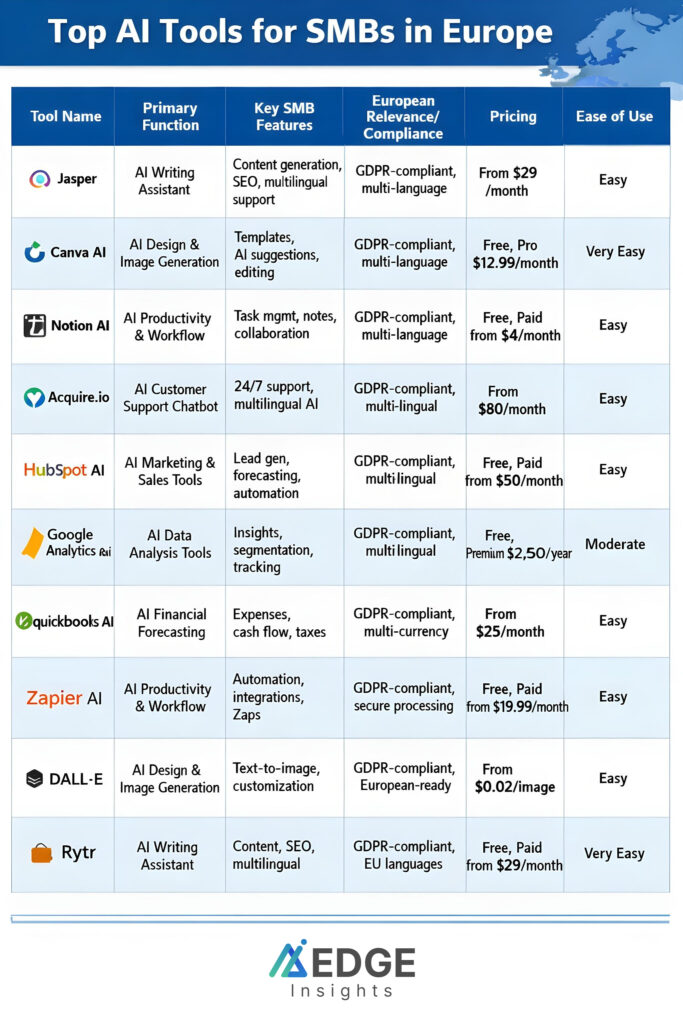
Choosing the Right AI Tool for Your Specific Business: A Step-by-Step Guide
Step 1: Identify Your Business Needs and Pain Points
Selecting an AI tool requires identifying particular challenges or inefficiencies that you need to solve. After establishing your needs and budget, the next step involves researching AI tools that will fulfil your specific requirements.
Questions to ask:
- What tasks take up most of your time?
- Are there any areas where you could improve customer engagement?
Start with a specific problem you want AI to solve, rather than adopting AI just for the sake of using technology.
Expert Tip
Step 2: Define Your Budget and Resources
Determine your available financial resources and budget next. AI tools come in a wide range of pricing models, from free versions to premium subscriptions. Be realistic about how much your business can afford to invest in AI tools.
Questions to ask:
- What is your budget for AI tools?
- Do you have technical expertise in-house to implement and maintain the tool?
Prioritize tools that offer free trials or freemium models.
Expert Tip
Step 3: Research Tools Based on Needs and Criteria
Research AI tools that match your requirements after determining your budget and pain points. European startups developing AI tools might provide Better integration to area-specific business needs along with local regulations.
Questions to ask:
- Does the tool offer the features your business needs?
- How user-friendly is the tool?
- Does the tool integrate well with your existing software?
This type of guide helps you simplify your choice.
Expert Tip
Step 4: Evaluate European Relevance and Compliance
Your selection of tools should meet European GDPR requirements and comply with local data privacy laws when operating in Europe. The data handling policies should be straightforward, and the tool should either store data in EU territories or implement suitable GDPR compliance strategies.
Questions to ask:
- Does the tool meet GDPR standards?
- Does the tool store data securely and provide clear data privacy policies?
- Does it support the languages and regions youāre targeting in Europe?
European startup-created AI tools represent ideal choices because they integrate smoothly with business needs.
Expert Tip
Step 5: Test Drive Potential Tools
Take advantage of the free trials and demos available through AI tools while you decide which one will best suit your needs. Evaluate both tool performance and meeting customer requirements during your trial period..
Questions to ask:
- Does the tool help solve the problem you identified in step 1?
- Is the user interface intuitive and easy?
- Can your team get up to speed quickly with the tool?
Gather feedback from team members who will be using the tool daily.
Expert Tip
Step 6: Assess Integration Capabilities
Verify that the selected AI tool is compatible with all existing business software and applications. AI tools should integrate seamlessly with your existing platforms, including CRM software, project management tools, and accounting systems, to enhance and streamline existing workflows.
Questions to ask:
- Does the tool integrate smoothly with the existing systems?
- Does the tool offer APIs or connectors for easy integration?
Focus on tools that offer simple integration options
Expert Tip
Step 7: Consider Support and Training
AI systems present challenges to users due to their complexity, which requires support at installation time and during problem resolution. Choose solutions that provide robust customer service while offering training materials to users..
Questions to ask:
- Does the tool provide customer support via phone, email, or chat?
- Are there tutorials, documentation, or training materials available?
- Is support available in your businessās language or time zone?
Invest in basic training for your team to ensure they can maximize the tool’s potential.
Expert Tip
Step 8: Plan for Implementation and Training
You need to put your chosen AI tool into operation after finding the perfect solution for your business. Plan for a smooth rollout by ensuring your team knows how to use this tool effectively. Create a training plan and allocate resources for implementation.
Questions to ask:
- What training will your team need to use the tool effectively?
- Who will manage the tool once itās up and running?
Integrate AI tools gradually into your workflows and provide ongoing training.
Expert Tip
Step 9: Monitor and Evaluate Performance
Regular performance checks are necessary after deploying the tool. Evaluate the tool’s progress towards your established targets while verifying the actual return on investment it produces. You should plan to modify or test new tools as needed.
Questions to ask:
- Is the tool helping you solve the problem you identified in step 1?
- Is the tool worth the investment, or would a different tool be a better fit?
Regular performance assessments of AI tools must be followed by appropriate changes to the implementations. Networking with other SMBs can also help you share experiences and get recommendations.
Expert Tip
Future Outlook: AI Trends for European SMBs Beyond 2025
Increased Personalization
The ability of AI to personalize customer contacts continues to improve significantly. SMBs will need to deliver customized experiences to their customers through AI as consumer expectations continue to grow..
Impact for SMBs
AI enables SMBs to create personalized content, marketing campaigns, and product suggestions that foster dedicated customer relationships and lead to higher revenue.
More Accessible AI Tools
AI technology developments will lead to better accessibility for business tools that SMBs can utilize. The barrier to entry for using AI will continue to decrease, allowing more small businesses to take advantage of its benefits.
Impact for SMBs
With simpler tools that require less technical expertise, SMBs can adopt AI without the need for specialized teams or large budgets.
Emphasis on Ethical and Explainable AI
As organizations expand the use of artificial intelligence tools in business operations, AI will require more attention to ethical practices. The focus will shift toward making AI systems transparent for decision processes while ensuring algorithms maintain fairness in their operations.
Impact for SMBs
SMBs that choose ethical AI solutions will avoid the risks associated with biased decisions or unethical practices.
Hyper-Automation
The future development of AI will emphasize hyper-automation as a system that integrates artificial intelligence with robotic process automation technology. This will allow businesses to automate end-to-end processes, streamlining operations and eliminating manual tasks across departments.
Impact for SMBs Small and medium-sized businesses will have improved efficiency and reduced human errors as more processes get automated.
Vertical-Specific AI Solutions
The future will bring advanced AI solutions tailored to the specific business needs of distinct industries. From AI tools designed for retail, healthcare, or finance, these vertical-specific solutions will address the unique challenges businesses face in their sectors..
Impact for SMBs
SMBs will be able to select AI solutions that are more tailored to their industry, thereby enhancing the relevance and effectiveness of the tools.
Conclusion
Using proper tools will enable you to enhance your business operations, keeping you ahead of your competitors. When you choose helpful AI tools, you and your business will become more productive and lower expenses.
These tools exist to serve small businesses in European markets. Every business needs assistance with various tasks, and AI offers tailored solutions for each of them. These AI solutions range from basic writing tools, such as Jasper, to comprehensive customer support platforms, including Acquire.io. These tools are affordable, easy to use, and follow GDPR rules.
Selecting the right tools will help your business achieve better performance and stay ahead of your competitors. Examine the available AI tools for your business, then test free trials to prepare your company for the future applications of AI.










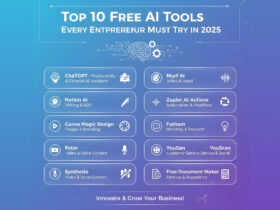








Leave a Reply